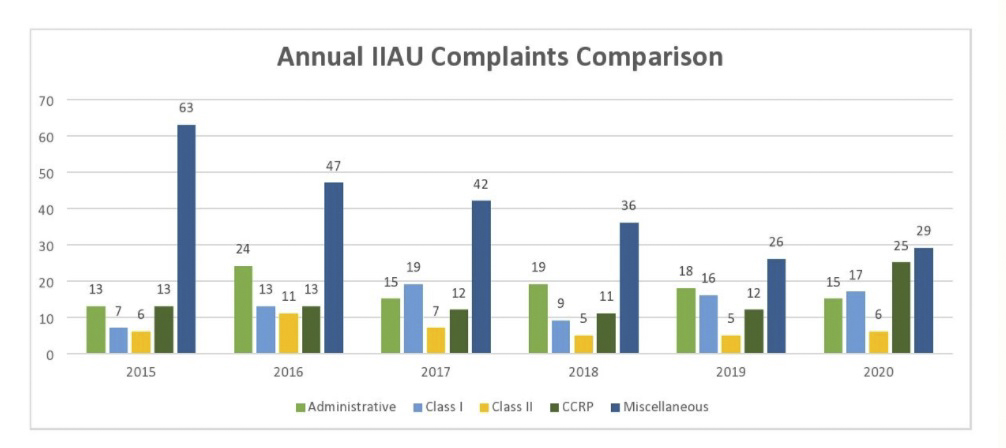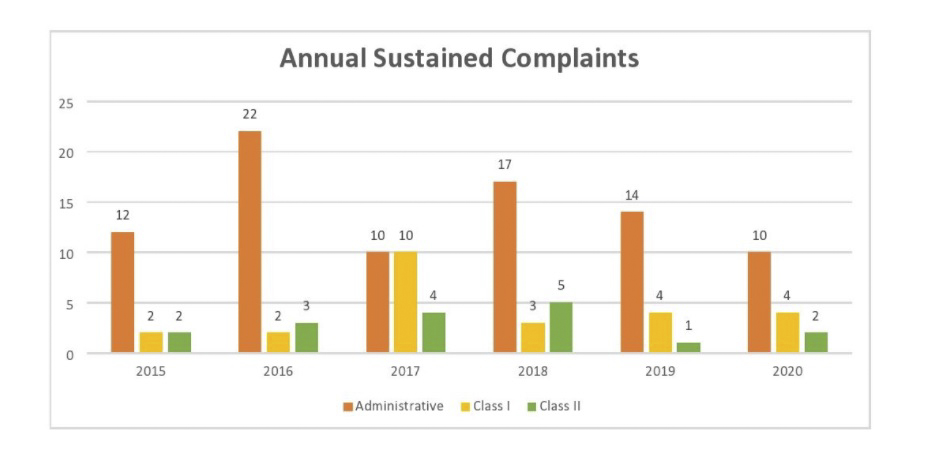Summary
This story is part of an in-depth report on the implementation and use of body-worn cameras by the Springfield Police Department.
The Hauxeda made two requests to look at body-worn camera footage from 2021 for the purposes of writing about body-worn cameras and the policies that govern their use in the Springfield Police Department. Both times, the requests were denied.
Certain provisions of the Missouri Revised Statutes outline a police officer's rights under an internal affairs investigation. Chapter 590 of the statutes offers a provision that protects records for police officers who are under or were under an internal investigation. The requests from the Daily Citizen were subject to a legal review by the Springfield Police Department. The reviewers concluded body-worn camera footage that is part of an internal investigation is a personnel record, and therefore, protected from public information requests.
“All records compiled as a result of any investigation subject to the provisions of this section shall be held confidential and shall not be subject to disclosure under chapter 610, except by lawful subpoena or court order, by release approved by the officer,” Provision 14 of statute 590.502.2 reads.
“The Springfield Police Department is bound by state law as to what records we must maintain as confidential,” Police Chief Paul Williams wrote in a formal response to the Daily Citizen. “The confidentiality requirement found in Section 590.502 applies equally whether the complaint is sustained, unfounded, withdrawn or if the officer is exonerated.”
Attorney Jean Maneke has practiced media and publishing law in Missouri for more than 25 years. She serves as counsel for members of the Missouri Press Association, and explained the Springfield Police Department’s use of two different Missouri statutes to deny access to body camera footage.
“There is really a two-pronged approach going here. On the side of law enforcement and criminal activity, (records) are closed under the provisions that say investigative materials are closed until the prosecution becomes final, which can be a long time in certain situations,” Maneke said.
Inactivity is defined as the time after a prosecuting attorney decides they won't be prosecuting a defendant anymore, the statute of limitations for the suspected crime has expired, or a criminal defendant has been convicted of a crime and has exhausted all of their legal appeals.
“When an investigation becomes inactive, then body camera footage can be revealed,” Maneke said. “That's one track, that's the criminal track. Then we have the employee track, the personnel track.”
The other provision, Chapter 590, applies to cases where a police department employee is the subject of an internal investigation.
“That's a personnel action, and those two things run sometimes at the same time, but more often, the criminal investigation part runs first and the personnel part runs second,” Maneke said.
Maneke said it will be hard for anyone who makes a Sunshine Law request to obtain body camera footage from a law enforcement agency until all criminal cases and internal affairs cases are resolved.
“That is still going to be a record that they can keep confidential, because it relates to the public body's personally identifiable information from an employee, and it may also be part of a criminal prosecution,” Maneke said.
Layers of accountability
Chief Williams says he was encouraged that camera footage helped determine that 21 complaints against Springfield Police Officers in 2021 were not substantiated.
“That helped to substantiate my belief that we have really good people who do really good things almost all the time,” Williams said. “If they do something wrong, we're going to hold them accountable and correct that behavior.”
The police chief points to the fact of zero citizen-driven complaints against Springfield police officers in the entire month of February 2022 as a sign of success. Springfield is also in the process of revitalizing the Police Civilian Review Board.
Rev. Marlon Graves was appointed to the Police Civilian Review Board on Feb. 22, 2022, and sworn in on March 7. Graves explained he has lived in Springfield and in Miami-Dade County, Florida, at different times in his life, and has long been interested in police officers' relationships with the public.
Graves has prior experience with the Springfield Police Chief's Citizen Advisory Group, and has long been a supporter of Springfield officers wearing cameras.
“When you put that camera on the body and that camera and that police officer are doing that job, it says everything,” Graves said. “You can't go backwards with it, you can't go sideways with it, all you can do is take heed to what's being seen, and it's accountability in all respects.”
To Graves, the investment in tax dollars is worth it for people who will come into contact with police officers.
“I do understand that budgeting has been part of the reason as to why (cameras were) not implemented before, but at the end of the day, it balances the playing ground,” Graves said. “It gives each person involved the ability to see what's really going on, and it puts our officers on a standstill to where what they say and what they do have to match up.”
During his time as an adjunct instructor at Miami Dade College, Graves said he regularly took ridealong shifts with Miami Dade police officers in order to better understand them, their work and the community.
“Working in a very urbanized community that I was working in, I was always hearing it from young men of color,” Graves said. “For me? I come from Springfield. I did not experience what they experienced, there was a difference.”
Graves hopes the Springfield Police Civilian Review Board can create a layer of accountability to the public for police officers, and help build a trust between Springfield residents and the Springfield Police Department. One of the best ways to build trust is with good communication, he said.
“At the end of the day, everybody just wants the truth, so it's a matter of how you receive and dish it back out,” Graves said. “I've always said — just like any reverends or pastors might say — you want to be able to distribute the Good News the right way and not the wrong.”

Complaints about police actions
The Springfield Police Department Inspections and Internal Affairs Unit (IIAU) is responsible for investigating complaints of misconduct against SPD employees and keeping statistics on those complaints.
Williams said cameras have virtually eliminated cases of “he said, she said,” where a citizen complaint doesn’t match a police officer’s report, but the investigation into an incident is inconclusive.
“It has almost, not quite but almost, eliminated what we used to have as a ‘not sustained complaint,' meaning a citizen complains about an officer and the officer goes, ‘No, I didn't do that,' and I have nothing objective to substantiate that complaint or not, and we have to go, ‘Hey, I understand, but I can't figure out what happened,” Williams said.
The investigators in the police department’s internal affairs unit record incidents, including disciplinary actions taken, officer-involved vehicle pursuits, use of force by police officers and vehicle accidents involving on-duty Springfield Police Department employees. The internal affairs unit also handles internal audits of the police department’s funds, inspections of cash funds and evidence and background checks for the city of Springfield related to certain licensing applications.
The unit classifies the complaints it receives into five different types, with the most serious complaints labeled “Class 1.” Class 1 complaints include accusations of a police officer committing a crime or excessive use of force. Accusations of improper procedure or an officer being rude to a Springfield resident fall into “Class 2” complaints.
In 2020, the Springfield Police Department internal affairs unit received 92 complaints, a 19.5 percent increase from the complaint total in 2019.

Different types of complaints for different situations
Forty-eight of the complaints from 2020 were external complaints made by citizens. Seventeen of those were Class 1 complaints, the most serious complaints for issues including excessive force or accusations of police officers committing criminal acts. Four of those complaints were sustained, which means the investigators found in favor of the person making the complaint against a police officer.
“I encourage people if they think someone did something wrong, if they think an officer misbehaved or their actions were inappropriate, I want to know about it,” Williams said.
Two more complaints for lesser violations by police officers were sustained, and there were 10 cases where officers were found to have violated administrative procedures.
After cameras were introduced, there were 21 complaints in 2021 that were determined to be unfounded, withdrawn or resolved based on video footage.
“On the other end of the spectrum, we had nine investigations where the body-worn cameras assisted with helping to approve or disprove as a complete full investigation, and one of those resulted in a sustained complaint that the officer did something wrong,” Williams said.
Other types of complaint classifications are administrative, miscellaneous and a class called the Citizen Complaint Resolution Process, in which the person filing the complaint has a face-to-face meeting with the police department employee they are making the complaint about and with that employee’s supervisor. Miscellaneous complaints generally occur when a person disputes the guilt or innocence of someone accused of a crime.
Williams said the Springfield Police Department wants to investigate complaints, and if a complaint is substantiated, correct misbehavior by police officers. At the same time, they want to be able to explain why a complaint against the police department was unfounded.
“I think the element of trust and transparency and accountability, both on the part of officers and citizens, is as expected or even moreso,” Williams said. “It's kind of cliche, but people behave better if someone is watching them or they think someone is watching them.”
The specialists handle Sunshine Law requests from prosecutors, defense attorneys, from journalists and from others who request the footage. Not everyone who asks for arrest or investigation footage gets it, however.
“I use the term, maybe it's somewhat off the cuff, but to address the voyeuristic members of the public or even the media. ‘Hey, I just want to see it because I want to see it.' No, we're not going to do that,” Williams said.

